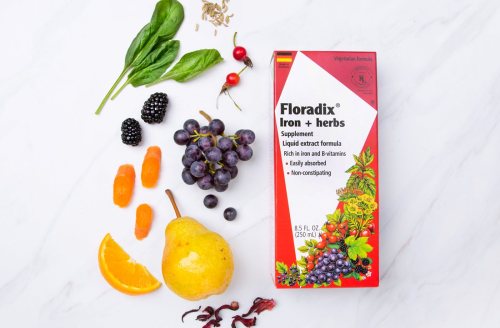advertisement
This common nutritional disorder might be why you’re so tired—here’s how to get your energy back, according to an RD
How Robyn Nohling, RD, MSN, and owner of Real Life Women's Health avoids iron deficiency through a well-balanced diet and solid supplement routine.

Pop quiz: How many people do you think are low in iron? Considering 1.6 billion people (which is about a quarter of the world’s population, btw) are anemic, and an estimated 30 to 50 percent of them have iron-deficiency anemia, that puts the answer to our math problem at around… 800 million. Guess right?
If those giant numbers are blowing your mind, let us break it down for you. Anemia—when your blood doesn’t have enough healthy red blood cells—affects a lot of people, and it can have a pretty major impact on your health.
“If you don’t have enough iron, you don’t have enough hemoglobin, because your body needs iron to make hemoglobin,” explains Robyn Nohling, FNP, RD, MSN, and owner of Real Life Women’s Health. “Hemoglobin is really important because it’s how your body transports oxygen to your tissues, organs and muscles.” Safe to say iron is a must-have-at-all times kind of nutrient.

So how do you know if you’re iron deficient or not? “A big sign is people often feel tired,” Nohling says. “They might also feel short of breath doing everyday activities that didn’t used to leave them feeling short of breath.” In the past, Nohling struggled with low iron levels, which made it difficult for her to focus and left her feeling like she had to drag herself out of bed in the morning. Sound familiar?
If your body is nudging you to bump up your intake, Nohling says adjusting your diet to include iron-rich sources should be your go-to move, and taking a natural supplement like Floradix®—a liquid iron supplement that promotes formation of healthy red blood cells—can also help. Plus, Floradix® contains digestion-friendly fruits and veggies like spinach, carrots, and pears to make the notoriously hard-to-digest nutrient more easily absorbed.

A key way Nohling prevents herself from dipping in iron is by zoning in on her nutrition. “Getting nutrients from food is the way the body absorbs and utilizes those nutrients best,” she says. “What that means for me is eating three meals a day that contain carbs, protein, and fat, along with three to five snacks that contain carbs and protein or fat.”
If you’re plant-based or vegetarian, it can be trickier to nail down your iron intake just right, which is where supplementing and paying closer attention on your weekly grocery runs come into play. “Iron-rich plant sources include spinach, spirulina, pumpkin seeds, legumes, and soybeans,” Nohling says. “If you can pair these foods with vitamin C-rich foods (citrus, berries, and bell peppers), that can increase absorption.” See why Flora paired spinach with vitamin-C rich fruits in Floradix®?
Follow-up pop quiz: Did the million number of iron-deficient people just decrease by one? If you’re keeping a close eye on your nutrition, listening to your body, and opting for an iron-boosting supplement, the correct answer is yes.
Sponsored by Flora
Top photo: Stocksy/ZHPHProduction
The information in this article is the opinion of the author and/or individuals quoted and in no way reflects the policies or positions of Flora Health. This is not intended to be a substitute for professional medical or nutrition advice.
Sign Up for Our Daily Newsletter
Get all the latest in wellness, trends, food, fitness, beauty, and more delivered right to your inbox.
Got it, you've been added to our email list.




